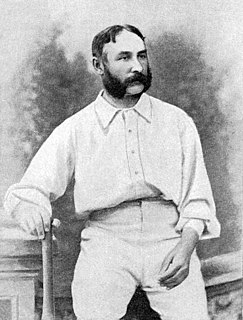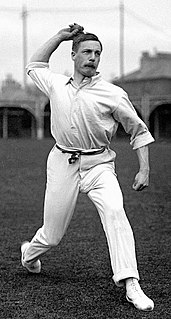
Sir John Berry Hobbs, always known as Jack Hobbs, was an English professional cricketer who played for Surrey from 1905 to 1934 and for England in 61 Test matches between 1908 and 1930.

Sir Leonard Hutton was an English cricketer who played as an opening batsman for Yorkshire from 1934 to 1955 and for England in 79 Test matches between 1937 and 1955. Wisden Cricketers' Almanack described him as one of the greatest batsmen in the history of cricket. He set a record in 1938 for the highest individual innings in a Test match in only his sixth Test appearance, scoring 364 runs against Australia, a milestone that stood for nearly 20 years. In 1952, he became the first professional cricketer of the 20th Century to captain England in Tests; under his captaincy England won the Ashes the following year for the first time in 19 years. Following the Second World War, he was the mainstay of England's batting, and the team depended greatly on his success.

Walter Reginald "Wally" Hammond was an English first-class cricketer who played for Gloucestershire in a career that lasted from 1920 to 1951. Beginning as a professional, he later became an amateur and was appointed captain of England. Primarily a middle-order batsman, Wisden Cricketers' Almanack described him in his obituary as one of the four best batsmen in the history of cricket. He was considered to be the best English batsman of the 1930s by commentators and those with whom he played; they also said that he was one of the best slip fielders ever. Hammond was an effective fast-medium pace bowler and contemporaries believed that if he had been less reluctant to bowl, he could have achieved even more with the ball than he did.

Edward Mills Grace was an English first-class cricketer in the second half of the 19th century who was an all-rounder, batting right-handed and bowling slow right arm underarm. He played for Gloucestershire County Cricket Club and was the elder brother of W. G. and Fred Grace. All three played for England against Australia in September 1880 two weeks before Fred Grace died. Always known by his initials, E. M. Grace controversially held amateur status but was criticised for the money he made by playing.

William Chatterton was an English cricketer and footballer. He played first-class cricket for Derbyshire between 1882 and 1902 and for England in 1891/2. He captained Derbyshire between 1887 and 1889 and scored over 10,000 runs in his first-class career as well as taking over 200 wickets. He played football for Derby County, being one of 19 sportsmen to achieve the Derbyshire Double of playing cricket for Derbyshire and football for Derby County.
Paul Nicholas Weekes is an English former cricketer. He is a left-handed batsman and a right-arm offspin bowler.

Matthew Claude Mills is an English professional footballer who plays as a defender for Indian Super League club Pune City.

Gary Roland Mills is an English former professional footballer and manager.
1866 was the 80th season of cricket in England since the foundation of Marylebone Cricket Club (MCC). The highlight was the emergence of W. G. Grace as the game’s leading batsman with the highest first-class score since William Ward’s innings in 1820. James Southerton emerged as an outstanding bowler and the first known "century before lunch" was scored.
John Price was an English first-class cricketer who played 11 matches for Worcestershire in the late 1920s. He had the unwanted distinction of never playing in a winning side in his entire first-class career.
The New Zealand cricket team toured England in the 1927 season. The team contained many of the players who would later play Test cricket for New Zealand, but the tour did not include any Test matches and the 1927 English cricket season was the last, apart from the Second World War years and the cancelled South African tour of 1970, in which there was no Test cricket in England.
Peter John Squires is an English former rugby union player and a first-class cricketer, who played in forty nine first-class matches for Yorkshire County Cricket Club between 1972 and 1976.
Michael St John Packe was an English historian, biographer, and cricketer. He was the author of The Life of John Stuart Mill (1954), and four other historical works. A right-handed batsman, he played for Leicestershire County Cricket Club between 1936 and 1939, captaining them in 1939. He also played first-class cricket for Cambridge University and represented the Egypt national cricket team.
John Barnard was an English amateur first-class cricketer active from 1815 to 1830. He was born at Chislehurst in Kent and played mainly for Kent teams and the Marylebone Cricket Club. He made 18 known appearances in first-class matches, including for the Gentlemen in the Gentlemen v Players series.
John Mills was a British soldier, politician and amateur cricketer who played first-class cricket from 1816 to 1820.

Albert Edward Lawton was an English cricketer who played first-class cricket for Derbyshire between 1900 and 1910 and for Lancashire between 1912 and 1914. He captained the Derbyshire team between 1902 and 1905 and also played for London County and Marylebone Cricket Club (MCC).
Derbyshire County Cricket Club in 1873 was the third cricket season which the English club Derbyshire played. Officials and supporters were disappointed that they had been unable to arrange further first-class fixtures than the two against Lancashire, but they managed to arrange an extra match against Nottinghamshire, who were a leading team at the time.
John Mills was an English cricketer who played in one first-class cricket match in 1870, this being the inaugural first-class match played by Gloucestershire against Surrey at Durdham Down in June 1870. Mills scored 17 runs and held 1 catch.
David Cecil Mills was an English cricketer. Mills was a right-handed batsman who bowled right-arm medium pace. He was born in Camborne, Cornwall and educated at Clifton College, where he represented the college cricket team.
John Peter Crispin Mills, known as Peter Mills, is an English former cricketer who played from 1979 to 1982 for Cambridge University and Northamptonshire. He appeared in 41 first-class matches as a right-handed batsman. Mills was born in Kettering on 6 December 1958 and is the son of Michael Mills, who played for Cambridge University and Warwickshire after the Second World War.









